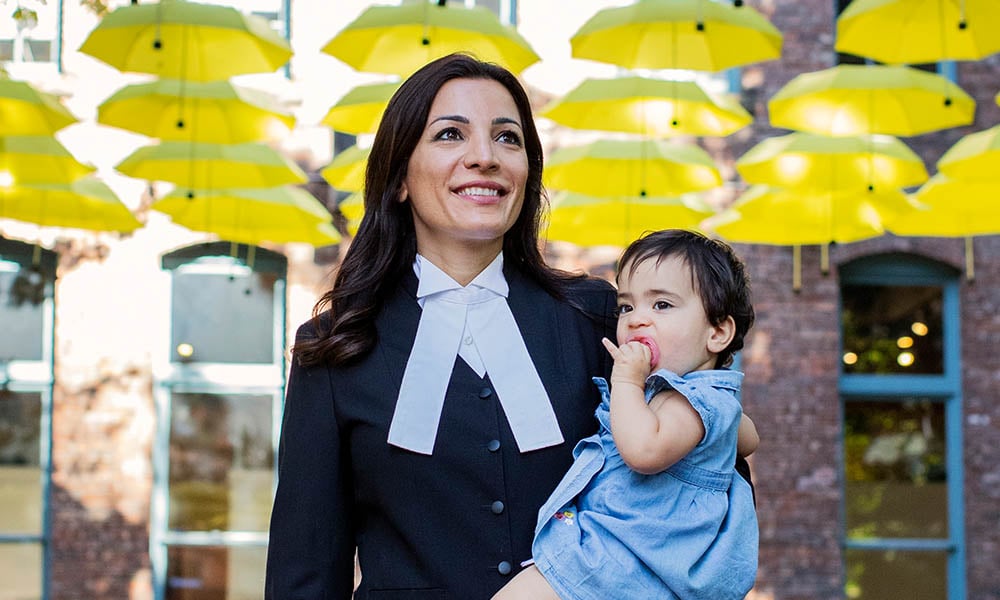
Combatting the ‘adverse reaction to women becoming pregnant or wanting kids’

When Vancouver family law lawyer Leena Yousefi went into labour prematurely with her firstborn child, she was sitting in a meeting with two other lawyers (both men). Yousefi had a maternity leave plan, but her daughter arrived two months early and she wasn’t completely prepared.
The experience of premature birth and becoming a mother “opened up this new world,” says Yousefi, the founder of YLaw, which she calls the fastest growing female-led law firm in Western Canada.
When she started investigating attitudes toward lawyers becoming mothers, she says, she heard female law students tell her they’d been advised not to wear a wedding band to their interviews, “because then they could be looked at as potential mothers and therefore a liability … or to speak of work-life balance.”
Yousefi had initially planned to take a couple of weeks off work after her daughter’s birth; she then started bringing the infant to work with her. “I realized I was becoming much more efficient, empathetic, hard-working and multitasking, because I had a child. So, the question was, why are women a liability because they have children? Why are children a negative thing in their lives?
“In my company, the biggest asset is women who have small children … If you’ve been a mother, you’ve already proven how efficient you can be. I wanted to bring that to my business, instead of pushing them out.”
Today, Yousefi’s practice is thriving, which she attributes to the family- and child-friendly policies she’s developed; she also prefers to hire new mothers, she says. So, how best to support lawyers who are also mothers?

At YLaw, lawyers can work part-time or full-time, at home or in the office, and have “unlimited” vacation time providing they meet the targets they themselves have set when they joined the firm.
“You’re investing in that in exchange for long-term loyalty, and not losing good talent,” Yousefi says. “People never want to leave; they’ll stay, and come back.”
In March the firm went one step further, and introduced four-day workweeks. The working days may be a little longer, but that’s more than compensated for by the beneficial effect of an extra day off for rejuvenation, she adds. In fact, she says, the firm has become more profitable since, increasing its staff size and its revenues by 30 per cent.
“People started being more productive, we started receiving resumes from people I wouldn't even dream of applying to us, because they liked the model and they wanted to work for us.”
As well, not all new mothers want to return to work full-time, and firms would do well to allowing part-time work schedules post-leave; for example, 80-per-cent full-time at four days a week.
Aside from being allowed to work from home or in the office, all of YLaw’s staff are welcome to bring their children into work with them, any day. Yousefi’s daughter, Saoirse, is now 18 months old, an age at which she prefers to run and play. But Saoirse’s caregiver brings her to mom’s office for an hour each day, between 3 and 4 p.m.
“All of our lawyers and staff gather, and have coffee, and play with her. Everyone gets a mental break from our practice; I still breastfeed her, then kiss her goodbye and she goes home.” Not only does it create a sense of community and balance, but Yousefi says she is all the more focussed when she returns to her work tasks.

The BBC ran a piece on Yousefi when Saoirse was still an infant; Yousefi’s assistant brings Saoirse to court, allowing mother to breastfeed daughter outside the courtroom during breaks. “The judges were very kind when she cried outside the door,” Yousefi admits; “they took a break. … Actually, kids bring a lot of light to a very tense situation, so everybody’s been very happy with my kid around, to be honest.”
McCarthy Tétrault LLP has won several awards for its family-friendly workplace practices, which have included a maternity leave “buddy,” i.e., a more experienced female lawyer within the same practice group who can act as a mentor to expectant lawyers.
YLaw also has a “buddy” system in place, meaning that each time a lawyer wants to take a vacation or leave or sabbatical, the buddy comes in and takes over, says Yousefi. The system has worked well, she adds; several months in advance of a birth the buddy knows the expectant mother is going on maternity leave and can start preparing to take over her files. When the new mother returns to work, the buddy starts to flow her work back to her, and can take on new clients.
At least one regulator has stepped in to offer financial support for those on parental leave. In 2009 the Law Society of Ontario launched a Parental Leave Assistance Plan, one of the nine recommendations developed by the Law Society’s Retention of Women Working Group and designed to assist in maintaining the viability of small firms and sole practices after the birth of a child. The Law Society provides a sum of $750 a week to eligible applicants for up to twelve weeks, to a maximum of $9,000 per leave per family, to cover expenses associated with maintaining their practice during a maternity, parental or adoption leave.